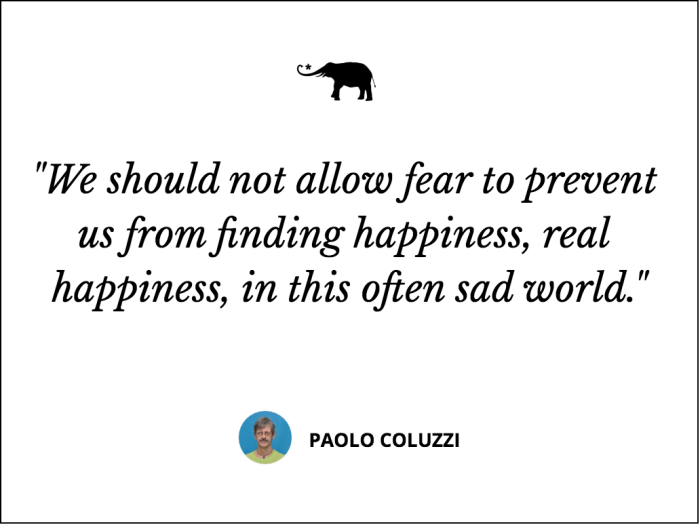View this post on Instagram
There is an old song by Iron Butterfly, a group from the 1960s, that I like a lot.
When I first listened to their famous album “In-A-Gadda-Da-Vida,” the first line of one of its songs hit a chord in me.
It was a simple question: Are you happy? As a matter of fact the song is about recalling a past relation, a simple love song, but that first line, wow!
It was like a question addressing me directly: Was I happy? Are you happy? I thought that was the first, perhaps the most important, question we should ask ourselves: Am I doing things that make me and the people around me happy?
I’m not talking about those good moments or that sort of euphoria we all experience every now and then when we are with good friends or doing something pleasurable. Obviously, nothing is permanent in this world, and happiness and sadness come together, one following the other. I’m talking about something deeper, something that involves peace, serenity, equanimity, contentment, and satisfaction…not something easy to achieve, but are we trying?
Are we on the way? Are we following the Dao, as the Taoists would ask? Even if it may be for just a few minutes every day, are we doing something that makes us happy? Something good for us and for the world? Something that makes us feel we are part of a whole, of this vast universe?
There are many ways we can try to achieve this, from our everyday activities and our relations to spiritual practices of different kinds. What is important, I believe, is to always keep this question in mind, and if the answer is “No, I’m not happy,” perhaps we should try and start changing something in our lives.
Life is not easy, and as the Buddha highlighted, there is a lot of suffering. Cream, another great band from the 1960s, reminded us that “There’s a world of pain,” and further on in the same song they ask, “Is there a reason for today?” Is there? I’m not sure, but what I do believe is that we have to minimize the suffering and maximize the happiness, as the Buddhist monk Ajahn Jayasaro has explained.
Most importantly, we should not allow fear to prevent us from finding happiness, real happiness, in this often sad world.
Of course, we have to be practical too, but we have to analyze our fears, as most of them are based on nothing real—just pessimistic thoughts about the future. For example, it is possible to live with less money in a simple way. Even though it may not be for everybody, it is even possible to live without money.
If you have a chance, have a look at the book The Moneyless Man: A Year of Freeconomic Living by Mark Boyle. Even though I do use money in my everyday life, I find the book inspiring. After all, most of what most people, including me, possess is not really so useful or important and it may probably be done without. Much better for the environment too.
I had a friend in Italy many years ago whom I had met in an acting course I was following at the time. He was the most interesting character, a young guy who was a “follower” of the philosopher Erich Fromm (the author of To have or to be?). He was a simple factory worker and a pacifist. One day, he found out that the factory he was working in was producing some components for some military weapon (I can’t remember exactly what type).
At that point, since this went against all he believed in, he refused to be an accomplice in the production of an instrument of death, and he was fired. So he decided to drop out and went to live in his parents’ garage, as they were not using it. He made it as cozy as he could, and surrounded by his beloved books, he survived with a small vegetable garden, sawing even his own clothes. For the rest of his needs, he just did some odd jobs here and there. A simple, unknown person, but wise and whole. And above all, he looked happy! I’ve always admired him.
Another person I liked and admired was José, I guy I used to see every day asking for spare change in a corner between two squares in Granada, Spain, where I spent one great year of my life. He had a big beard and was barefooted and always cheerful and smiling. He lived with his girlfriend in a cave in the hills surrounding Granada, where the gypsies used to live in the past.
Everybody knew him, and he was always happy to exchange a few words with anybody who had time to spare. I used to give him a few coins whenever I came across him, but I remember one day when I didn’t have any spare change. I told him that I would give him something later on that day, and he told me not to worry. A few hours later, I bumped into him while he was on his way back to his cave. I greeted him and took out of my wallet the coins I had promised him. However, he stopped my hand and said with his captivating smile, “I’ve finished working for today, perhaps tomorrow!” and left without taking my money. What a great guy!
To conclude, the happiness we should aim for, I believe, comes with love, not necessarily (or not only) love for a partner, but something much bigger: love for everybody and everything, starting from ourselves as parts of this vast universe.
This happiness doesn’t come from money and wealth. This sense of connection, of interrelatedness with what surrounds us, is the aim of many spiritual practices, meditation, and mindfulness.
Let us all try to be happy!
~











Read 2 comments and reply